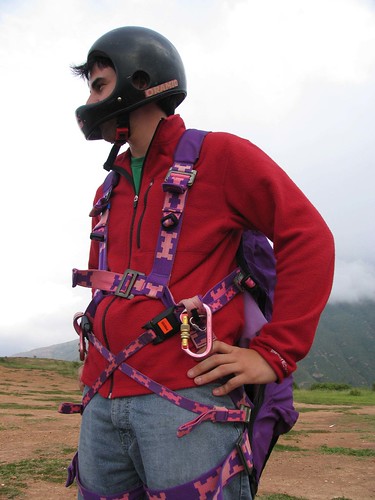WOTW#5
Word of the week: flojo (lazy)
For my Spanish class last Tuesday I had to write an essay about Venezuelans. Rocío wanted me to tell her about her countrymen and women: Who are they, what are they like, and how have my perceptions, as a foreigner, changed in the last seven months?
I probably could have cobbled together bits and pieces from old blogs to give her a somewhat complete answer. And to a certain extent, I did. Remember when I complained about how loud this place was? That was in there. Or about machismo and all its trappings in Venezuelan culture? Obviously, that made an appearance. But after giving it some fresh thought, there was one characteristic that somehow has evaded the blog: la flojera venezolana, or Venezuelan laziness.
Okay, okay. I know I poked fun of our grandparents’ opinions of Latin Americans (and their view of them, on the whole, as lazy people) in a blog months ago. And I write about my flojo friends and this flojo country a bit uneasily, if only because I still don’t necessarily believe it. Thing is, Venezuelans sure do, and they love trying to convince me that they are, in fact, lazy.
Example No. 1: In our cab ride from the Colombian border town of Cúcuta to Venezuela’s San Cristóbal, our taxi stops in tollbooth traffic. Some guy walks up and sprays the windshield with some goopy green stuff and proceeds to clean off the windshield. Our chavista cabbie says nothing until the job is done and he has paid the guy a couple hundred bolívares. He then turns and remarks, “People here are just so lazy.” He shakes his head. “Everyone just wants to live the easy life and beg. Whatever happened to getting a job?”
Example No. 2: David, Brooke’s first Spanish instructor, is eating tacos for lunch with us in our apartment and decides to tell us about Latin Americans. “It’s well known,” he starts, “that certain peoples have certain characteristics. Mexicans, for example, eat a lot. There are a lot of prostitutes in Perú. Colombians can sell anything to anyone at any time. And Venezuelans, well, we’re lazy. We are who we are.”
Example No. 3: In a column in one of the national newspapers, a Venezuelan writer named Nelson Bocaranda Sardi explains his country’s overall condition with regard to facilismo, or the art of taking the easy route: “Corruption and gambling are key to attaining easy money. Credit cards are the lifejackets that keep them afloat. They don’t save. They spend their salaries before receiving it.” The message? No one wants to work, even in planning his or her own financial futures.
Why do many Venezuelans—both supporters and opponents of Hugo Chávez, mind you—believe they live amongst a bunch of idlers? A lot of it, I think, has to do with Chávez and his political divisiveness. Whether you love him or hate him, Chávez has empowered the poor through a slew of varyingly effective social programs. These programs, called las misiones, range in scope from literacy programs to technical job training. Along with the classes come small checks; chavistas say the money is well earned, while la oposición says the programs are loaded with people who care only about getting a work-free check once a month.
The other problem might be Venezuela’s golden egg, oil. Ever since the black gold was discovered under Lake Maracaibo in the 1910s, the country has had no other substantive export. Venezuela lived and died with oil. By the late ’20s, the country was the world’s leading exporter, and the country soon turned away from agriculture and put all of its eggs in the petrol basket. While the money rarely trickled down to the poor folks in the cities or the country, plenty of people working for oil companies, or in auxiliary industries, got rich quickly. For a particular cadre of Venezuelans, weekend shopping sprees in Miami and degrees from foreign universities were not uncommon. This concentrated wealth became part of a national consciousness, and spawned a national conundrum: How can a country with so much oil money have so much poverty? I can’t help wonder if the poor ever thought to themselves, “The rich have screwed me at every turn, and the government steals as much as they can, so when and if somebody does throw me a line, you’re damn right I’ll hold on as long as I can.”
At least that seems to be part of what’s going on today. Venezuela sees its flashy past in the rearview mirror these days now that its one-horse economy has taken hit after hit in the world oil market. Following the national strike several years ago, Chávez fired everyone at the country’s largest oil company, PDVSA, and nationalized it. Now PDVSA, which sells its oil in the States through Texaco, is paying for the social programs. The anti-Chávez crowd calls it is a waste of money and crass political pandering, while pro-Chávez groups applaud the misiones as an appropriate and long-overdue allocation of national oil revenue. Obviously, the split between rich and poor—both financial and ideological—is as wide as ever before. And when people are sick of complaining about or standing up for Chávez, the conversation turns back to their flojo countrymen.
I still don’t know if I buy it, though. Can laziness really be a national characteristic? It might just be an acquired trait, though: Considering this is the just fifth WOTW in seven months of blogging, I just might be the laziest person I know here in Venezuela.


0 Comments:
Post a Comment
<< Home